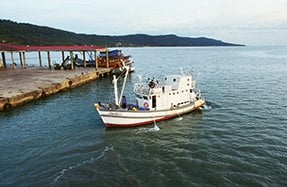Rural development and enhancing livelihoods

Having a comprehensive understanding of where and how our ingredients are produced, and the challenges farmers and their communities face, enables us to support rural development. By working closely with farmers, we can promote better agricultural practices, work towards responsible sourcing and help to improve their livelihoods, as well as secure a long-term supply of raw materials.
57% of our raw ingredients purchased in 2017 were responsibly sourced
63% of our raw ingredients purchased in 2017 were traceable
431 000 farmers were trained in good agricultural practices in 2017
Our approach
We support farmers and rural communities through a range of activities. We are improving access to markets, providing training and technical support, helping them develop alternative income streams, and encouraging women’s empowerment. Through our agripreneurship programme, we are especially supporting young people to become the next generation of farmers. Programmes such as Farmer Connect and the Sustainable Agriculture Initiative Nestlé (SAIN) help us strengthen and secure long-term supplies of high-quality raw materials.
See our full report (pdf, 12Mb) for details of our progress against our commitments to improve rural development and enhance livelihoods.
Partnering for good
Through our partnership with the International Federation of Red Cross and Red Crescent Societies (IFRC), we support access to water, sanitation and hygiene, and empowering women in areas where we source our products.
Food security
Together with our supplier Givaudan, we support the training of cultivators to apply the System for Rice Intensification in our vanilla-growing communities. This method originated in Madagascar and is aimed at gaining a better yield from rice fields. We also support farmer training on home gardening for family nutritional needs, as well as honey production to generate alternative revenues.
Boosting farmers’ income
We are supporting women cocoa famers to develop new sources of income to improve their incomes and livelihoods. By rearing chickens to sell, the women can gain access to additional income streams and boost their financial independence.
Improving animal welfare
We have announced our aim to purchase and use only cage-free eggs in all our products across the globe by 2025. Separately, we have pledged that, by 2024 we will improve welfare standards for all the broiler chickens we buy in the USA – all part of our aim to create a healthier future.
Coffee ambassadors lead the way
To support coffee farmers in Thailand, we have launched a Nescafé Ambassador programme. Chosen for their motivational and personal skills, the ambassador farmers receive training on better farming practices and then pass on their learning to hundreds of other coffee growers, creating a network that brings widespread benefits for everyone.
Taking farming online
The Escuela Nescafé – or Nescafé School – is a joint initiative between the renowned Tecnológico de Monterrey university in Veracruz, Mexico, and Nestlé. The school has developed an online e-learning platform, the Aula Virtual Nescafé, aimed at developing the entrepreneurial vision of the Nescafé Plan farmers. The online course allows coffee farmers to learn at their own pace and build the necessary skills and knowledge to take their farming businesses forward.
Cooking for two
To improve nutrition and dietary diversity for coffee farmers in Kenya, we provided a cookery demonstration with a difference – the participants were farmers and their spouses. Together, the couples received advice in using vegetables that can be grown in the kitchen gardens we are helping farmers develop to boost both incomes and dietary diversity.

